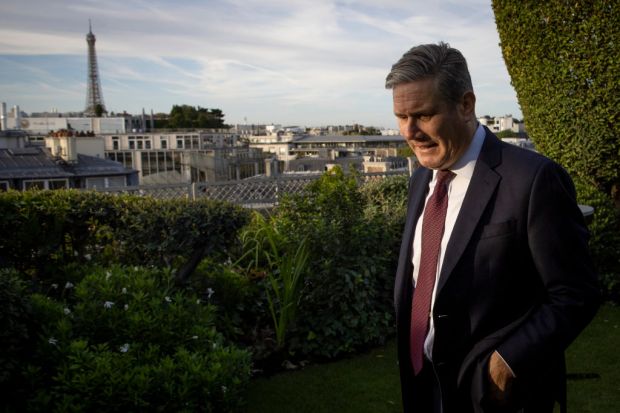Why does Keir Starmer seem set on following the example of the French Socialist party, and leading Labour into electoral oblivion? The sad truth is that it could all have been so different. Back in September 2019, at the height of the Brexit saga, it was obvious that Corbyn’s Labour was increasingly contemptuous of Britain’s white working-classes. But instead of reaching out to Red Wall voters, Starmer has doubled down on this misguided approach. The miserable state of the French left should serve as a warning to Labour that you betray your traditional voters at your peril.
In the last few years, France’s Socialist party has imploded, reduced to such penury that they had sold their Paris HQ. It is a humiliation they brought upon themselves. Smug, self-righteous and out-of-touch, this party of overwhelmingly middle-class metropolitans had for a decade turned away from their working-class supporters in search of more ‘wholesome’ voters. As one left-wing think tank advised the party in 2011:
‘The France of tomorrow is above all united by cultural and progressive values. It wants change. It is tolerant, open, optimistic and inclusive…it is opposed to an electorate that defends the present and the past against change.’
Replace ‘France’ with ‘Britain’ in the above sentence and it could have been an email sent in the last year by any one of Labour’s front bench. As the party has shown repeatedly under Starmer’s leadership, Labour still shudders at those who speaks well of Britain’s heritage. Flags, statues, Royal Family, you name it: Labour will not speak up for it. It’s bewildering that the party has learned nothing from the fate of Comrade Corbyn.
In France, the only figure on the left who appears to understand that progressive values aren’t a vote winner is Jean-Luc Mélenchon of the far-left France Insoumise. The 69-year-old is a 20th Century Socialist, an avowed anti-capitalist who in the late 1980s castigated François Mitterrand for shedding Socialist principles.
In the 2017 election, he polled over seven million votes in the first round, nearly five million more than the Socialist Party (and only 600,000 fewer than Marine Le Pen). In the second round he caused something of a stir with his refusal to endorse Emmanuel Macron over the leader of the National Front.
Melenchon’s success in that first round turned him into a figurehead for the left, the first time he had enjoyed such status. Younger, more aggressive activists, imbued with Anglo-Saxon identity politics, flocked to his party and Mélenchon has undoubtedly been tarnished by association. In 2018, for example, he and his party (and the National Front) were told not to attend a rally organised by Jewish groups after the murder of an elderly Jewish woman in Paris. Organisers accused La France Insoumise of harbouring a growing number of anti-Semites. Last year, he fell out with Charlie Hebdo when the satirical magazine accused him of being an Islamist appeaser, an accusation that Mélenchon refuted.
Nonetheless, Mélenchon is still for the most part his own man. He doesn’t jump on any passing progressive bandwagon, which helps explains why Black Lives Matters gained no traction in France last summer. There were a couple of marches but then the demonstrations petered out. It might have been a different story if Mélenchon had taken a knee. Instead he rubbished the idea of ‘white privilege’, declaring that the people who push that narrative ‘have never seen a poor white’. He added that the only separatism in France ‘is that of the rich who live among themselves in their ghettos’.
This week he mocked the young Green mayor of Poitiers, who has stopped funding the city’s flying clubs because, in her view, it is wrong for children to ‘dream’ of working in an industry that pollutes the sky. ‘Calling Poitiers,’ tweeted Mélenchon. ‘Dreams remain free. Signed Icarus.’
Mélenchon doesn’t shy away from confronting France’s often brutal colonial past. In a tweet last year to mark the 75th anniversary of VE Day, he reminded his followers that on the same day in 1945 French soldiers in Algeria had embarked on a killing spree that claimed thousands of civilian lives. He acknowledges France’s role in the slave trade but is proud to point out that, in 1794, the National Convention abolished slavery in France and its colonies.
Mélenchon has the intellectual breadth to love his country and its flag, while recognising its failings past and present.
The flag that repels him is the blue and gold of the E.U. In 2017, he called for its removal from the National Assembly because he considered its presence an intrusion; and last year he saluted Britain for breaking free from the yoke of Brussels. One Socialist MEP, Sylvie Guillaume, said Mélenchon’s support of Brexit was ‘grotesque’.
Recently, Mélenchon was alone among the mainstream political class in defending a carnival in Marseille, sympathising with the despair of a people who, for the past year, have had their liberty taken from them by a government that treats them like children.
In short, Mélenchon understands his electorate far more than any other figure on the left in France. That is the reason he has 2.2 million followers on Twitter, and Olivier Faure, the leader of the Socialists, has 57,000.
Mélenchon is not in thrall to the mainstream media, and he doesn’t mould his views to fit their progressive middle class dogma. The same can’t be said for Starmer. It often feels that he decides that day’s policy once he’s digested the Guardian with his morning coffee.
That’s why Labour is doomed to defeat in next month’s Hartlepool election, and that’s why Labour will go the way of the Socialists in France: a fringe party trapped in their own infernal echo chamber.
<//>
Got something to add? Join the discussion and comment below.
Get 10 issues for just $10
Subscribe to The Spectator Australia today for the next 10 magazine issues, plus full online access, for just $10.





















Comments
Don't miss out
Join the conversation with other Spectator Australia readers. Subscribe to leave a comment.
SUBSCRIBEAlready a subscriber? Log in